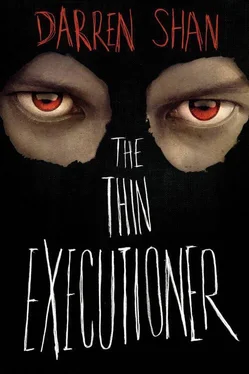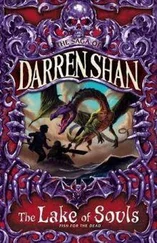Um Siq had to prove themselves at every stage of their life, test after test, trial after trial. They slept in pens with other children once they’d been weaned. They had to scrap for food and clothes. Many died as infants. Only the strongest survived. There was no room for weakness. Every member of the tribe could fight if required to do so. That was how they had maintained their independence, standing firm in the face of powerful enemies, defending their city-state over the course of many centuries, sometimes abandoning it for long periods to hide in the mountains but always returning to drive out invaders and seek revenge.
Jebel wasn’t sure what to think of Hubaira. She was by no means pretty, but he found her confidence and strength oddly attractive. He was certain she could beat him, and just about any other Um Aineh boy, in a fight, but he was no longer troubled by that. He had decided that Um Siq women were different. There would be no shame in losing to one of them.
Jebel found himself thinking that it would be an asset to marry a woman like Hubaira. No man in Wadi could boast of a warrior wife. Perhaps if he completed his quest and returned to claim the hand of Debbat Alg, he might venture north again one day, to court Hubaira or another like her.
Trying not to appear too obvious, he asked Hubaira about her people’s marital customs.
“At the moment there are more men than women,” she said, “so each woman has a number of husbands. If that changes in the future, men will be able to take more than one wife. That has always been our way.”
“What about marriages with people of other nations?” Jebel asked.
“We don’t breed with outsiders.” Hubaira snorted at the idea and so put a swift end to Jebel’s thoughts of seeking a wife among the Um Siq.
The temperature didn’t rise much, even at noon. They paused for a rest after a few hours, and a short sleep in the afternoon, then pushed on again. Hubaira said they should be in the city of Abu Siq by the next evening if they marched late into the night and started early the following morning.
At one point Tel Hesani noticed part of a man-made drain running along a wall. It seemed out of place, so he asked about it. Hubaira snarled and started kicking the structure, soon reducing it to dust. Jebel and Tel Hesani watched, bemused. When Hubaira calmed down, she explained her behavior.
“Long ago a powerful race occupied Abu Siq. They were here longer than most invaders and almost wiped us out — only nineteen of us survived. The invaders tried to make life more comfortable for themselves. They built dams and drains to divert the course of a stream that flowed through the siq then, and erected huge new buildings, some of the most intricate ever constructed on Makhras.
“The nineteen survivors bred and grew strong, rearing their children to be even harder than themselves. They waited patiently, increasing over many generations, then returned and slaughtered every single occupier. They tore down the new buildings and destroyed the dams and drains. But the siq is long, and sections of the drains remain, hidden by sand and stones for centuries, only revealed when the earth shifts. We destroy the old bits of drain whenever we find them.”
Hubaira’s story struck a chord with Tel Hesani. As he’d told Jebel, his people had at one time controlled most of Makhras. There was a legend that at the height of their power they’d built an incredible city in the wilderness to serve as an earthly home for the gods. (They still worshipped multiple gods then.) According to the legend, the gods disapproved of the city — it was more impressive than any of their own — and laid it low.
Was Abu Siq that city of myth, and had Tel Hesani’s forebears fallen not at the feet of otherworldly gods but at the hands of vengeful Um Siq? The slave felt that he had just unlocked a major mystery of his people’s past. He sighed heavily when he realized that he would never be able to share his discovery and that it would most likely die with him in a cave of destiny far to the desolate north.
Night fell on the siq. Jebel pulled on an extra tunic and wrapped a long strip of cloth around his head, as many Um Aineh did when traveling in colder climes. Hubaira thought he was soft for covering up, but she didn’t say anything. The ways of foreigners were none of her business, so long as they didn’t interfere with her.
The fireflits appeared not long after dusk and resumed their never-ending hunt for pollen. Jebel found the scent of burning ash soothing. It reminded him of the smell of fresh blood, and he found himself thinking about home and the many fine executions he’d witnessed. But that led him to think of the messy slaughter in Hassah, and he scowled as he silently mocked the Um Nekhele’s legal system. “Jails” indeed! You couldn’t beat a good, clean blow of an axe for real justice.
Jebel was thinking about jails and executions, idly studying the dancing flames generated by the fireflits, when he noticed the fires blowing out above him. He had grown used to the spreading, flickering patterns, but this was different. Instead of each flower burning out separately, a large number were being quenched at the same time, along a straight line that was moving swiftly towards the travelers.
“Hubaira,” he said nervously, “is that a gust of wind?”
Hubaira glanced back at him, then followed where his finger was pointing. When she saw the growing line of darkness, she cursed, whipped out her dagger, and swung her staff over her shoulder. Holding the dagger in her left hand and the staff in her right, she moved ahead of Jebel and Tel Hesani. “Keep back,” she spat. “Prepare your weapons. If I fall, fight like demons. Don’t run. It will probably kill you in battle, but it will definitely hunt and slaughter you if you run.”
Before Jebel could ask what it was, a huge, shadowy form leapt from the wall of the siq. It shrieked as it jumped. The shriek was so piercing that Jebel and Tel Hesani covered their ears with their hands. But Hubaira raised her dagger and took a half-step closer to the creature.
The beast lunged at Hubaira, shrieking again, but when she didn’t move, it pulled up short and struck at her with a long claw. Hubaira ducked, whacked the claw with her staff, then slid within the creature’s reach and stabbed at it with her dagger. The creature howled, leapt back, then struck at her again.
As the creature and the Um Siq girl battled, Jebel caught flashes of the beast. It was unlike any animal he’d ever seen. Its body was similar to a bear’s, but its legs were much longer, and it had a narrow head, with a double row of teeth, one set overlapping the other.
Hubaira’s dagger sank into the creature’s stomach. The beast screeched with pain as she yanked it out, but instead of retreating, it threw itself at her. She almost wriggled out of its way, but it caught her leg and dragged her down. She lashed out with her staff, but the creature knocked it from her hands and was quickly on her, snapping at her chest and neck.
Tel Hesani had stood back while the creature attacked, but when he saw it pin Hubaira, he swept in to help her. He got close enough to strike but then saw that the beast’s back was shielded by a bonelike shell. He paused to pick his spot. Beneath the animal, Hubaira was stabbing with her dagger, opening up numerous small cuts in its unprotected stomach, but she didn’t have enough room to drive her dagger in deep.
The beast’s shell was layered, spreading down its back in ridges. Between the ridges, when the beast stretched, there were gaps. Tel Hesani positioned his sword over one of the sections where a pair of ridges met. The beast had been biting at Hubaira’s head, but after a few seconds it reared back, then went for her neck. The gap between the ridges widened, and Tel Hesani drove his sword down and in.
Читать дальше







